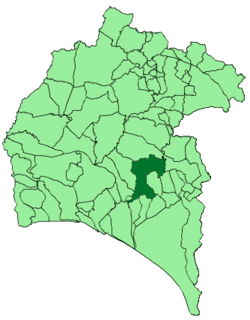Niebla, Spain facts for kids
Quick facts for kids
Niebla
|
|||
|---|---|---|---|
|
|||
| Country | Spain | ||
| Autonomous community | Andalusia | ||
| Province | Huelva | ||
| Area | |||
| • Total | 223.62 km2 (86.34 sq mi) | ||
| Elevation | 45 m (148 ft) | ||
| Population
(2018)
|
|||
| • Total | 4,103 | ||
| • Density | 18.3481/km2 (47.521/sq mi) | ||
| Time zone | UTC+1 (CET) | ||
| • Summer (DST) | UTC+2 (CEST) | ||
| Website | http://www.niebla.es/es/ | ||
Niebla is a cool town in southern Spain, located in a region called Andalusia. It's part of the Huelva province, right by the Rio Tinto river. The town is about 30 kilometers from the city of Huelva and 60 kilometers from Seville.
Around 4,100 people live in Niebla today (as of 2018). The town is famous for its amazing 2-kilometer-long wall that goes all the way around it! There's also an old castle, called the Alcazar, which was mostly built in the 1400s. And guess what? A super old Roman bridge still stands over the Rio Tinto river, and people still use it!
A Look Back in Time
Niebla has a really long history, going back about 3,000 years! Long ago, it was important because of its silver mines. Traders from a place called Phoenicia started using these mines around 800 BC. When the Roman Empire was powerful, Niebla was a big trading and political center known as Ilipla.
Under Muslim Rule
By the year 713, Niebla came under Muslim control. It became part of the Emirate of Córdoba in 756, and even more strong walls were built around the town.
Later, in 1023, Niebla became the capital of its own small kingdom, called the Taifa of Niebla. Its army even fought against the Taifa of Seville. But Niebla lost that battle and came under the control of Seville in 1053.
The Reconquest
Muslim rule in Spain started to weaken after 1212. In 1262, Alfonso X of Castile, a Christian king, conquered Niebla. Stories from the siege (when the town was surrounded and attacked) suggest that Niebla might have been the first place in Spain where gunpowder was used in battle!
Learn More
 In Spanish: Niebla (España) para niños
In Spanish: Niebla (España) para niños
 | John T. Biggers |
 | Thomas Blackshear |
 | Mark Bradford |
 | Beverly Buchanan |




